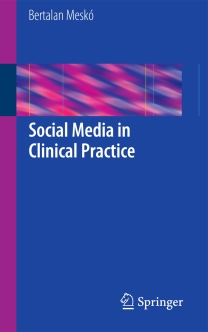How to review a book on Medical Social Media written by an author, who has learned you many Social Media skills himself?
Thanks to people like Bertalan Meskó, the author of the book concerned, I am not a novice in the field of Medical Social Media.
But wouldn’t it be great if all newcomers in the medical social media field could benefit from Bertalan’s knowledge and expertise? Bertalan Meskó, a MD with a Summa Cum Laude PhD degree in clinical genomics, has already shared his insights by posts on award-winning blog ScienceRoll, via Twitter and Webicina.com (an online service that curates health-related social media resources), by giving presentations and social media classes to medical students and physicians.
But many of his students rather read (or reread) the topics in a book instead of e-learning materials. Therefore Bertalan decided to write a handbook entitled “Social Media in Clinical Practice”.
This is the table of contents (for more complete overview see Amazon):
- Social media is transforming medicine and healthcare
- Using medical search engines with a special focus on Google
- Being up-to-date in medicine
- Community sites Facebook, Google+ and medical social networks
- The world of e-patients
- Establishing a medical blog
- The role of Twitter and microblogging in medicine
- Collaboration online
- Wikipedia and Medical Wikis
- Organizing medical events in virtual environments
- Medical smartphone and tablet applications
- Use of social media by hospitals and medical practices
- Medical video and podcast
- Creating presentations and slideshows
- E-mails and privacy concerns
- Social bookmarking
- Conclusions
As you can see, many social media tools are covered and in this respect the book is useful for everyone, including patients and consumers.
But what makes “Social Media in Clinical Practice” especially valuable for medical students and clinicians?
First, specific medical search engines/social media sites/tools are discussed, like (Pubmed [medical database, search engine], Sermo [Community site for US physicians], Medworm [aggregator of RSS feeds], medical smartphone apps and sources where to find them, Medical Wiki’s like Radiopaedia.
Scientific Social media sites, with possible relevance to physicians are also discussed, like Google Scholar and Wolphram Alpha.
Second, numerous medical examples are given (with links and descriptions). Often, examples are summarized in tables in the individual chapters (see Fig 1 for a random example 😉 ). Links can also be found at the end of the book, organized per chapter.
Third, community sites and non-medical social media tools are discussed from the medical prespective. With regard to community sites and tools like Facebook, Twitter, Blogs and Email special emphasis is placed on (for clinicians very important) quality, privacy and legacy concerns, for instance the compliance of websites and blogs with the HONcode (HON=The Health On the Net Foundation) and HIPAA (Health Insurance Portability and Accountability Act), the privacy settings in Facebook and Social Media Etiquette (see Fig 2).
The chapters are succinctly written, well organized and replete with numerous examples. I specifically like the practical examples (see for instance Example #4).
Some tools are explained in more detail, i.e. the anatomy of a tweet or a stepwise description how to launch a WordPress blog.
Most chapters end with a self test (questions), next steps (encouraging to put the theory into practice) and key points.
Thus in many ways a very useful book for clinical practice (also see the positive reviews on Amazon and the review of Dean Giustini at his blog).
Are there any shortcomings, apart from the minimal language-shortcomings, mentioned by Dean?
Personally I find that discussions of the quality of websites concentrate a bit too much on the formal quality (contact info, title, subtitle etc)). True, it is of utmost importance, but quality is also determined by content and clinical usefulness. Not all websites that are formally ok deliver good content and vice versa.
As a medical librarian I pay particular attention to the search part, discussed in chapter 3 and 4.
Emphasis is put on how to create alerts in PubMed and Google Scholar, thus on the social media aspects. However searches are shown, that wouldn’t make physicians very happy, even if used as an alert: who wants a PubMed-alert for cardiovascular disease retrieving 1870195 hits? This is even more true for a the PubMed search “genetics” (rather meaningless yet non-comprehensive term).
More importantly, it is not explained when to use which search engine. I understand that a search course is beyond the scope of this book, but a subtitle like “How to Get Better at Searching Online?” suggests otherwise. At least there should be hints that searching might be more complicated in practice, preferably with link to sources and online courses. Getting too much hits or the wrong ones will only frustrate physicians (also to use the socia media tools, that are otherwise helpful).
But overall I find it a useful, clearly written and well structured practical handbook. “Social Media in Clinical Practice” is unique in his kind – I know of no other book that is alike-. Therefore I recommend it to all medical students and health care experts who are interested in digital medicine and social media.
This book will also be very useful to clinicians who are not very fond of social media. Their reluctance may change and their understanding of social medicine developed or enhanced.
Lets face it: a good clinician can’t do without digital knowledge. At the very least his patients use the internet and he must be able to act as a gatekeeper identifying and filtering thrustworty, credible and understandable information. Indeed, as Berci writes in his conclusion:
“it obviously is not a goal to transform all physicians into bloggers and Twitter users, but (..) each physician should find the platforms, tools and solutions that can assist them in their workflow.”
If not convinced I would recommend clinicians to read the blog post written at the the Fauquier ENT-blog (refererred to by Bertalan in chapter 6, #story 5) entiteld: As A Busy Physician, Why Do I Even Bother Blogging?
Book information: (also see Amazon):
- Title: Social Media in Clinical Practice
- Author: Bertalan Meskó
- Publisher: Springer London Heidelberg New York Dordrecht
- 155 pages
- ISBN 978-1-4471-4305-5
- ISBN 978-1-4471-4306-2 (eBook)
- ISBN-10: 1447143051
- DOI 10.1007/978-1-4471-4306-2
- $37.99 (Sept 2013) (pocket at Amazon)
Related articles
- “Social Media in Clinical Practice” Handbook Is Published! (scienceroll.com)
- Social Media in Clinical Practice: Chapter 1, The Introduction (scienceroll.com)
- Here comes Bertalan Meskó’s book on ‘social media’ (aplaceofmind.ubc.ca)
- My Book, Social Media in Clinical Practice, To Be Released on the 8th of August! (scienceroll.com)
-
Berci’s New Book Is A Winner (blogs.ubc.ca/dean/)
- Social Media in Clinical Practice: Chapter 3, Being Up-to-Date in Medicine (scienceroll.com)
















[…] How to review a book on Medical Social Media written by an author, who has learned you many Social Media skills himself? Thanks to people like Bertalan Meskó, the author of the book concerned, I a… […]
[…] Social Media in Clinical Practice by Bertalan Meskó [Book Review] | Laika’s MedLibLog. […]
[…] Social Media in Clinical Practice by Bertalan Meskó [Book Review] | Laika’s MedLibLog. […]